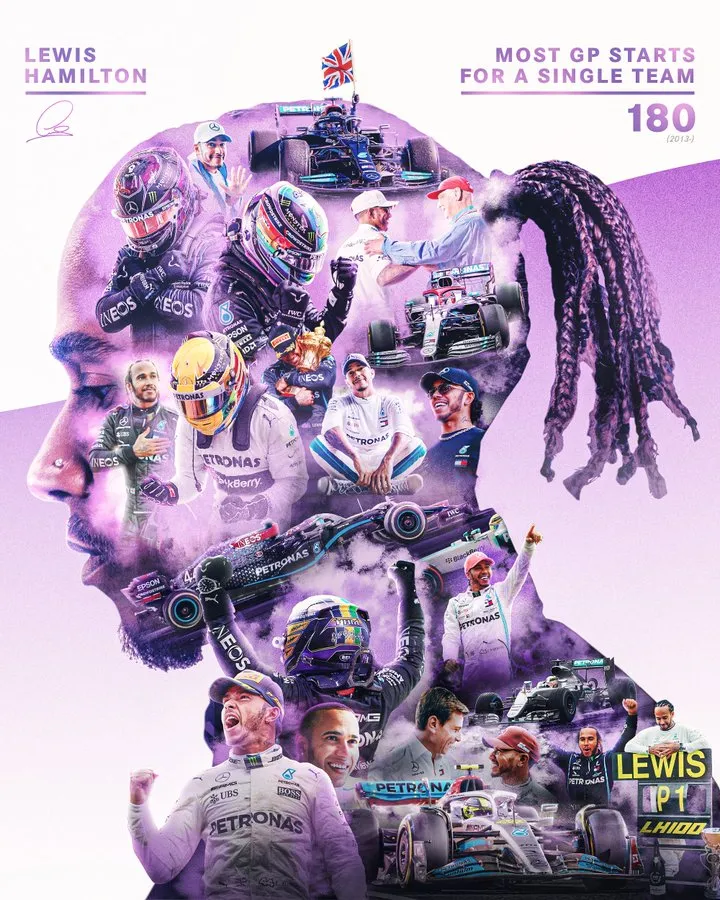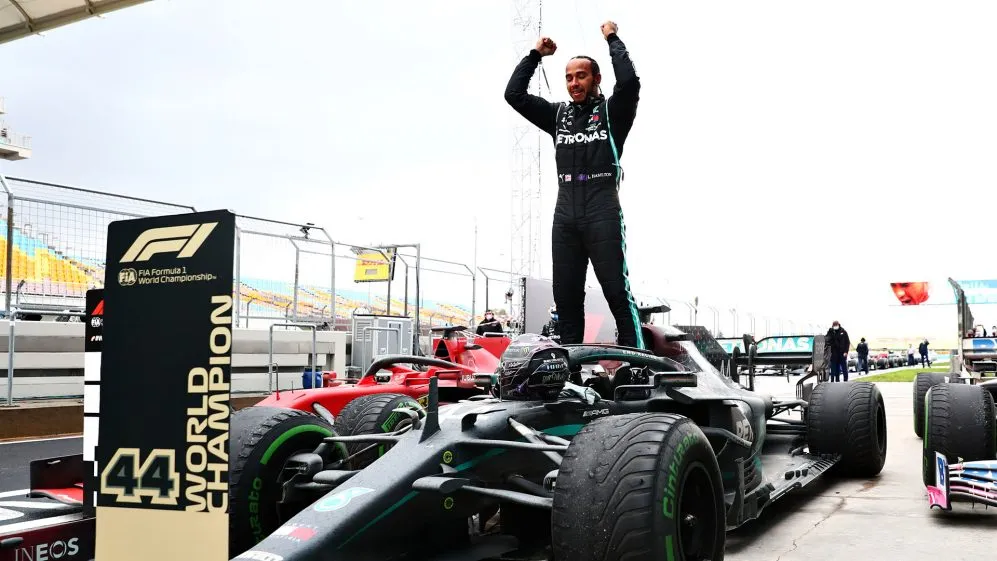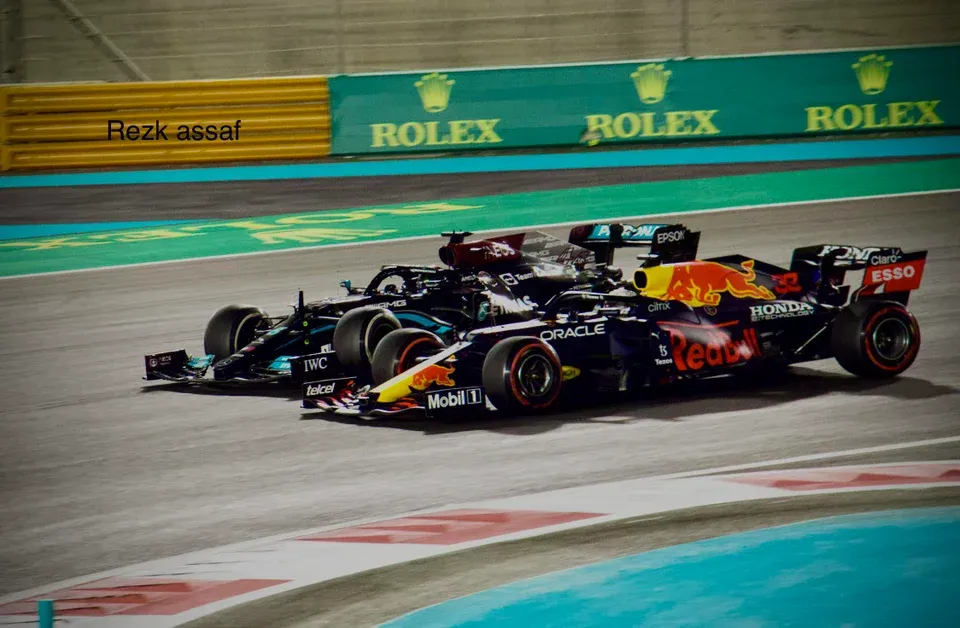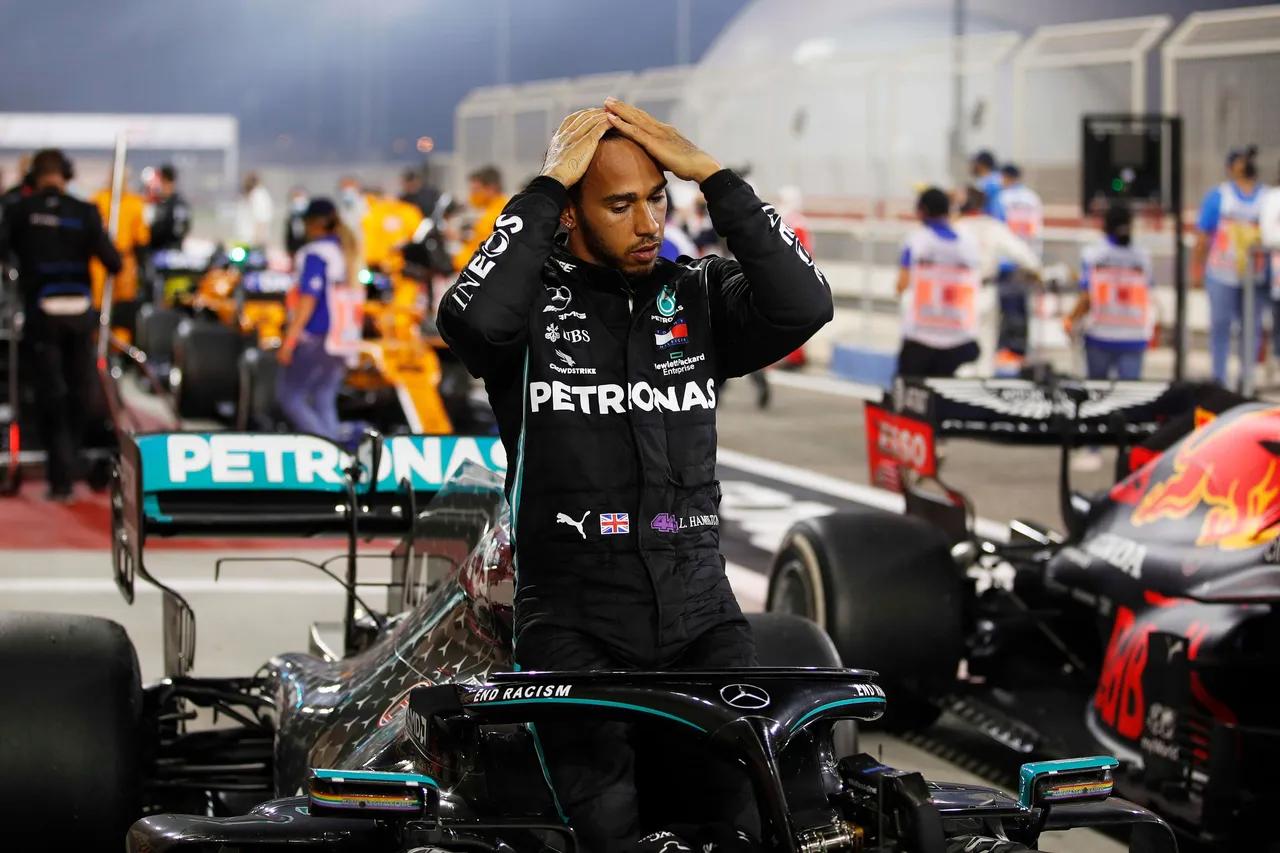
Cuantos recuerdos como los que vemos en la imagen que gentilmente ha posteado el usuario aadzwantstoknow en su cuenta de Reddit, apenas al inicio de esta temporada, estarán pasando por la mente del extraordinario excampeón mundial por siete veces igualando un récord, el de Michael Schumacher, que parecía destinado a perdurar en el tempo por años y años.
Los rumores de fin de año pasado, después de perder increíblemente el título a manos del actual campeón Max Verstappen, parecían conducir a un abandono no previsto. El largo silencio mantenido por el propio Lewis hasta el mismo momento de la presentación oficial de los monoplazas para la actual temporada, hacía pensar que algo, dentro del espíritu combativo de Hamilton, se había quebrado.
Es evidente que no es el mismo, al margen de los problemas de competitividad que su Mercedes pueda tener. Pero no es lógico suponer que, en condiciones normales y respetando las condiciones de Russell, esté siempre mirando las espaldas de su compañero.
Es cierto, por otro lado, que todos los riesgos de las innovaciones aerodinámicas consentidas por la nueva normativa FIA, cayeron sobre sus espaldas, dejando el monoplaza con menos cambios en manos de Russell.
Pero también es cierto que si estas modificaciones hubieran tenido el efecto esperado, a obtener ganancias de las mismas hubiera sido el propio Hamilton. Un riesgo calculado que, considerando la experiencia y la voluntad de Lewis Hamilton, no debería haber golpeado tan duramente su espíritu rebelde y combativo que lo ha caracterizado todos estos años.
Entonces, ¿cuál es el verdadero problema de esta debacle? O, dicho de otra manera, cuáles son los otros problemas -aparte de los mecánicos- que contribuyen a agudizarla?
Tratemos de analizarlos juntos en este post.

How many memories like those we see in the image kindly posted by user aadzwantstoknow on his Reddit account, just at the beginning of this season, will be going through the mind of the extraordinary seven-time former world champion, equaling a record, Michael Schumacher's, that seemed destined to stand the test of time for years and years to come.
The rumors at the end of last year, after incredibly losing the title to reigning champion Max Verstappen, seemed to lead to an unplanned abandonment. The long silence maintained by Lewis himself until the very moment of the official presentation of the cars for the current season, suggested that something, within Hamilton's combative spirit, had broken.
It is evident that he is not the same, apart from the competitiveness problems that his Mercedes may have. But it is not logical to suppose that, under normal conditions and respecting Russell's conditions, he is always looking at his teammate's back.
It is true, on the other hand, that all the risks of the aerodynamic innovations allowed by the new FIA regulations, fell on his back, leaving the car with fewer changes in Russell's hands.
But it is also true that if these modifications had had the expected effect, the one to profit from them would have been Hamilton himself. A calculated risk that, considering Lewis Hamilton's experience and willingness, should not have hit so hard his rebellious and combative spirit that has characterized him all these years.
So what is the real problem of this debacle? Or, to put it another way, what are the other problems - apart from the mechanical ones - that contribute to exacerbate it?
Let's try to analyze them together in this post.
La saturación de una carrera plagada de récords extraordinarios. / The saturation of a career plagued with extraordinary records.

La disminución del rendimiento de cualquier persona (artista, deportista, intelectual, etc.) llega con la saturación a través del tiempo (en este caso años).
Todos los que amamos la literatura, la música y el cine sabemos que los artistas expresan lo mejor de sí mismos generalmente al comienzo. Aunque siempre hay excepciones en mentes tan creativas en las cuales el paso del tiempo no hace mella.
Y en los deportes el razonamiento no cambia demasiado, aunque el contenido y el modo de expresar cada capacidad de alcanzar un determinado objetivo sea diametralmente opuesto.
Sin embargo la fama, el dinero, la potenciación del ego de cada uno hace que, en cualquier sector de la vida -incluyendo los políticos, aunque no estemos en tema- produce una merma en sus capacidades intelectivas-productivas.
Lewis Hamilton fue, en su momento, un joven prodigio. El más joven en su momento en ganar un gran premio. El que más puntos obtuvo en sus primeras carreras, nueve veces a puntos en sus primeras nueve carreras. El piloto que gano el gran premio de su país natal, el mayor número de veces (7 en Silverstone contra las seis de Alain Prost). Récords de puntos en una temporada (413 en 2019), 103 pole position a lo largo de toda su carrera, la misma cantidad de triunfos, mayor cantidad de puntos en toda su carrera, etc.
Muchos de esos récords prácticamente imposibles de superar en un futuro cercano y todo ello potenciado -aunque sea antipático decirlo- por el color de su piel. ¿Quién podia creer en 2007 que ese joven piloto de piel oscura, con orígenes paternos en un país (casi) desconocido como lo es Grenada iba a alcanzar la dimensión deportiva que hoy tiene? Había llegado también campeón de la GP2 (Formula 2) que es el trampolín de lanzamiento a la F1, siempre de la mano de Ron Dennis en McLaren. Solo le faltaron dos puntos ese año para coronarse campeón mundial. Compartió el segundo puesto con su compañero de equipo Fernando Alonso, detrás del campeón Kimi Raikkonen.
El primer piloto mulato en haber participado a un premio de Fórmula 1 (con todas las acepciones que a nivel popular tiene la palabra "mulato"). Y obviamente el primero en ganar un título mundial (en realidad el primer piloto afroamericano en testear -no corrió oficialmente- un auto de F1 fue Willy T. Ribbs en 1986 tras una invitación del entonces propietario del equipo Brabham, Bernie Ecclestone.
De ahí en más todo es historia. Hombre récord con 7 mundiales ganados junto a Michael Schumacher, a quien ha superado en números de grandes premios ganados, entre otros récords.
Después de 15 años y de haber logrado tanto ¿será este el año del paulatino e inexorable declino de Lewis Hamilton)?
¿Habrá perdido la motivación para seguir corriendo sin poder ganar con la frecuencia que lo hacía en el pasado?

The decline in performance of any person (artist, athlete, intellectual, etc.) comes with saturation over time (in this case years).
All of us who love literature, music and film know that artists express the best of themselves usually at the beginning. Although there are always exceptions in such creative minds in which the passage of time does not make a dent.
And in sports the reasoning does not change too much, although the content and the way of expressing each ability to achieve a certain goal is diametrically opposed.
However, fame, money and the empowerment of one's ego, in any sector of life -including politicians, although we are not on the subject- produce a decrease in their intellectual-productive capacities.
Lewis Hamilton was, at the time, a young prodigy. The youngest at the time to win a grand prix. The one who scored the most points in his first races, nine times in points in his first nine races. The driver who won the Grand Prix of his native country the most times (7 at Silverstone against Alain Prost's six). Records of points in a season (413 in 2019), 103 pole positions throughout his career, the same number of victories, the most points in his career, etc.
Many of these records are practically impossible to beat in the near future, and all this enhanced -although it is unpleasant to say- by the color of his skin. Who could have believed in 2007 that this young dark-skinned driver, with paternal origins in an (almost) unknown country such as Grenada, would reach the sporting dimension he has today? He had also become champion of the GP2 (Formula 2) which is the springboard to F1, always under the guidance of Ron Dennis at McLaren. He only lacked two points that year to be crowned world champion. He shared second place with his teammate Fernando Alonso, behind champion Kimi Raikkonen.
The first mulatto driver to have participated in a Formula 1 award (with all the meanings that the word "mulatto" has at a popular level). And obviously the first to win a world title (actually the first African-American driver to test -not officially race- an F1 car was Willy T. Ribbs in 1986 after an invitation from the then owner of the Brabham team, Bernie Ecclestone.
From then on, everything is history. A record man with 7 world championship wins alongside Michael Schumacher, whom he has surpassed in number of grand prix wins, among other records.
After 15 years and having achieved so much, ¿this will be the year of Lewis Hamilton's gradual and inexorable decline?
¿Has he lost the motivation to keep running without being able to win as often as he did in the past?
Un probable retiro ya anunciado. / A probable retirement already announced.

Luego de haber perdido el mundial de pilotos el año pasado a manos de Verstappen había anunciado en los círculos cercanos, especialmente amigos, que tenía pensado retirarse.
La desilusión de haber perdido un mundial que creía ganado sumado al estres de 15 años de competición habría sido el punto culminante para tomar esa decisión.
Sin embargo, aunque todo quedo en el mayor secreto, las tratativas llevadas adelante muy discretamente por el director deportivo de Mercedes, Toto Wolff (que hace poco pidió públicamente excusas a su principal piloto por lo "inmanejable" que resultaba el monoplaza) lograron convencer al británico que con un nuevo piloto al lado podia todavía aspirar al título.
Sin embargo, lo que era un proyecto de encontrar un escudero como lo tiene Verstappen en Red Bull con Pérez se confirmó por un lado en una suerte para Mercedes y por otro lado en un nuevo problema para Hamilton.
Porque Russell no solo se acopló inmediatamente al equipo, sino que hasta la última carrera en Montreal supero permanente a su compañero. El alumno que supera al maestro. Bien para Mercedes. Mal para Hamilton.
Lewis ha sido siempre un piloto extremadamente combativo, a nivel deportivo y personal, lo que probablemente esté causando con el correr de los años un cierto desgaste que le impida seguir compitiendo a los vértices que él pretende.

After losing the drivers' world championship last year to Verstappen, he had announced in close circles, especially friends, that he was planning to retire.
The disappointment of having lost a world championship that he thought he had won, added to the stress of 15 years of competition, would have been the culminating point to take that decision.
However, although everything was kept in the utmost secrecy, the negotiations carried out very discreetly by Mercedes sporting director Toto Wolff (who recently publicly apologized to his main driver for the "unmanageability" of the car) managed to convince the Briton that with a new driver at his side he could still aspire to the title.
However, what was a project to find a team mate as Verstappen has in Red Bull with Perez was confirmed on the one hand in a luck for Mercedes and on the other hand in a new problem for Hamilton.
Because Russell not only immediately fitted into the team, but until the last race in Montreal he permanently outperformed his teammate. The pupil outperforming the master. Good for Mercedes. Bad for Hamilton.
Lewis has always been an extremely combative driver, on a sporting and personal level, which is probably causing over the years a certain wear and tear that prevents him from continuing to compete at the level he intends.
Las secuelas del Covid-19 / The aftermath of Covid-19

Un detalle en el que muy pocos cronistas deportivos especializados se han detenido a analizar son las secuelas del Covid contraído por Hamilton en diciembre de 2020, a punto tal que debió dejar su butaca a su actual compañero Russell, que en ese momento corría con Williams.
Paradoja del destino, el Gran Premio del Baréin disputado en el circuito de Shakir fue ganada por Sergio "Checo" Pérez, que obtuvo su primera victoria en F1 y lo catapulto a firmar contrato con Red Bull. Por otro lado la buena actuación de Russell también lo confirmo en el futuro próximo de Mercedes para substituir a un Bottas que ya comenzaba a dar claras señas de no estar a gusto en Mercedes.
El primer semestre del 2021 fue bastante problemático para Hamilton, aunque se recuperó con creces en el segundo. Llegando a igualar la cantidad de puntos con Verstappen hasta la última famosa carrera, donde gracias a la safety car entrada a causa del accidente de Latify el holandés pudo ganar y coronarse campeón mundial.
Las secuelas del Covid (y tal vez Hamilton lo está experimentando actualmente con el excesivo "porpoising" de su monoplaza) no son las mismas para todas las personas.
En algunos casos la enfermedad se supera sin dejar demasiadas trazas. Y en otros casos deja una huella indeleble en el organismo, que tarde o temprano vuelve a representarse.
El cansancio, la fatiga, un organismo que no logra resistir a los vaivenes de una carrera dura con un auto que no ha encontrado la puesta a punto adecuada podrían ser secuelas imprevistas de una enfermedad sobre la cual la ciencia no ha dicho todavía la última palabra.

A detail that very few specialized sportswriters have stopped to analyze is the after-effects of the Covid contracted by Hamilton in December 2020, to such an extent that he had to leave his seat to his current teammate Russell, who at that time was racing with Williams.
As a quirk of fate, the Bahrain Grand Prix held at the Shakir circuit was won by Sergio "Checo" Perez, who obtained his first victory in F1 and catapulted him to sign a contract with Red Bull. On the other hand, Russell's good performance also confirmed him in the near future at Mercedes to replace Bottas, who was already starting to show clear signs of not being at ease at Mercedes.
The first half of 2021 was quite problematic for Hamilton, although he more than recovered in the second half. He was even on points with Verstappen until the last famous race, where, thanks to the safety car entry due to Latify's accident, the Dutchman was able to win and be crowned world champion.
The after-effects of Covid (and maybe Hamilton is currently experiencing it with the excessive "porpoising" of his single-seater) are not the same for everyone.
In some cases the disease is overcome without leaving too many traces. And in other cases it leaves an indelible mark on the organism, which sooner or later returns.
Tiredness, fatigue, an organism that does not manage to resist the ups and downs of a hard race with a car that has not found the right set-up could be unforeseen consequences of a disease about which science has not yet said the last word.
Un monoplaza indócil e inmanejable según Toto Wolff. / An unwieldy and unmanageable single-seater according to Toto Wolff
Dejo para la última parte del análisis las causas del momento de Mercedes y de Hamilton que están en boca de todos: un monoplaza "inmanejable" como lo ha expresado con absoluta sinceridad Toto Wolff, el jefe del equipo alemán. Y le ha pedido públicamente excusas a Hamilton por no poder darle un auto que vaya de acuerdo a sus capacidades y a su trayectoria.
Un Lewis Hamilton que se ha visto obligado a correr al reparo al mejor estilo de Nikki Lauda. El excepcional estratega austriaco, campeón mundial, que corrió para Ferrari siendo uno de los pilotos -campeones mundiales- que menos grandes premios gano en su carrera. No posee ningún récord prácticamente. Corría para ganar el campeonato y no para ganar carreras que es muy distinto. Sabía que los campeonatos mundiales se ganan sumando puntos y no necesariamente ganando carreras. Un perfil parecido tenía Alain Prost, aunque algo más agresivo.
Hamilton pertenece a la categoría opuesta de pilotos. Y tal vez también Verstappen, el tiempo lo dirá. A esa categoría a la que pertenecen ídolos inolvidables como Ayrton Senna que corren pura y exclusivamente para ganar. El título debe llegar no por imperio de las circunstancias sino a fuerzas de grandes premios ganados. Cuando esa meta no se logra algo se quiebra dentro de esos pilotos y no logran recuperarse.
La edad no es un obstáculo. Con 37 años, Hamilton todavía está en condiciones de dar batalla a los más jóvenes y lo demostró en el Gran Premio de Canadá disputado el fin de semana pasado. Claro está, si Leclerc no hubiera largado desde la última posición, difícilmente habría accedido al último escalón del podio.
Con una temporada ya (casi) perdida en cuanto a aspiraciones a obtener el título mundial -aunque en F1 nunca está dicha la última palabra- la mayor incógnita es saber si -de a poco- Mercedes lograra estar al paso de Red Bull y Ferrari para el 2023. Para que el británico pueda encarar la parte final de su carrera, todavía con esperanzas de ser el único piloto en la historia de la F1 en lograr 8 títulos mundiales.

I leave for the last part of the analysis the causes of the moment of Mercedes and Hamilton that are on everyone's lips: an "unmanageable" car, as Toto Wolff, the head of the German team, has expressed with absolute sincerity. And he has publicly apologized to Hamilton for not being able to give him a car that matches his capabilities and his trajectory.
A Lewis Hamilton who has been forced to race in the best Nikki Lauda style. The exceptional Austrian strategist, world champion, who raced for Ferrari being one of the drivers - world champions - who won the fewest Grand Prix in his career. He has practically no record. He raced to win the championship and not to win races, which is very different. He knew that world championships are won by scoring points and not necessarily by winning races. Alain Prost had a similar profile, although a bit more aggressive.
Hamilton belongs to the opposite category of drivers. And maybe Verstappen too, time will tell. To that category to which unforgettable idols like Ayrton Senna belong, who race purely and exclusively to win. The title must come not by force of circumstance but by the force of grand prix wins. When that goal is not achieved something breaks inside those drivers and they are unable to recover.
Age is not an obstacle. At the age of 37, Hamilton is still in a position to give battle to the younger drivers and he proved it in the Canadian Grand Prix held last weekend. Of course, if Leclerc had not started from the last position, he would hardly have reached the last step of the podium.
With a season already (almost) lost in terms of world title aspirations - although in F1 the last word is never said - the biggest question is whether Mercedes will be able to keep pace with Red Bull and Ferrari by 2023. So that the Briton can face the final part of his career, still with hopes of being the only driver in F1 history to win 8 world titles.


La parte inferior del banner de la firma corresponde al badget elaborado por el equipo de @hivebuzz. Mi agradecimiento a ellos y en particular a @arcange.
The lower part of the signature banner corresponds to the badget made by the @hivebuzz team. My thanks to them and in particular to @arcange.
El separador de párrafos es propiedad de The Peak Studio a quien agradezco la gentil concesión de uso.
The paragraph separator is the property of The Peak Studio to whom I am grateful for the kind permission to use it.
Traducido con / Translated with: DeepL Translator.